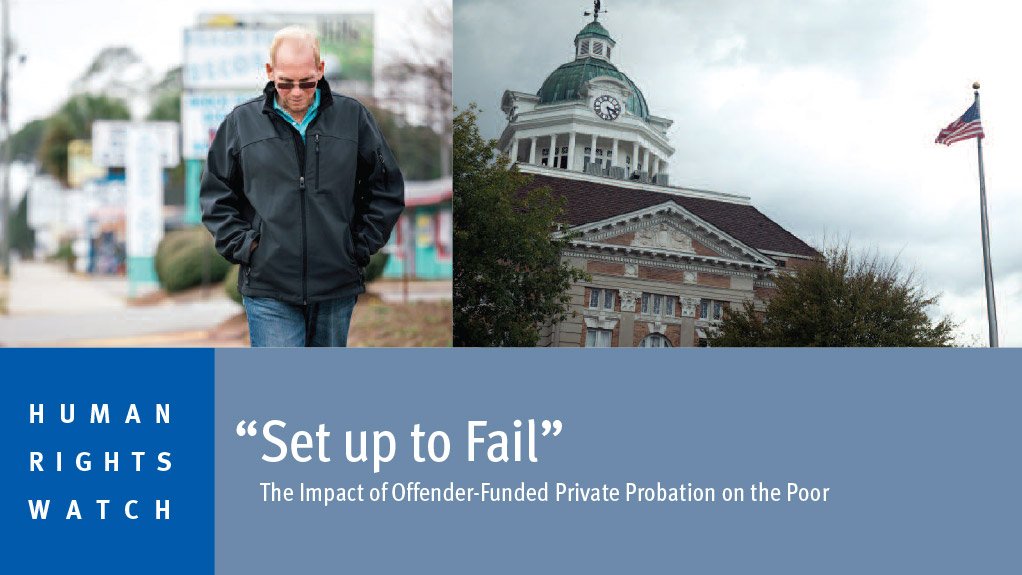- “Set up to Fail” – The Impact of Offender-Funded Private Probation on the Poor7.31 MB
Cindy Rodriguez, a 53-year old woman living in Murfreesboro, Tennessee, had never been in trouble – “never had a parking ticket” – until 2014, when she was charged with shoplifting. Rodriguez survives on disability payments due to injuries to her neck and back, and lives in constant pain. When her case went to court, she was represented by a public defender, provided to individuals living in poverty who meet certain criteria. Rodriguez said her public defender advised her to plead guilty and accept probation, saying it was the best deal she would receive from the state.
Rodriguez was placed on probation for 11 months and 29 days under the supervision of Providence Community Corrections, Inc. (PCC), a private company that had contracted with the Rutherford County government to supervise misdemeanor probationers. Rodriguez’s lawyer told her probation was nothing to worry about, that she would just have to visit her probation officer once a week and pay her fees and fines. When she informed the judge about her stark financial situation and disability payments, he told her to do the best that she could. She owed the court US$578 for the fine and associated fees, and on top of that she would have to pay PCC a $35-45 monthly supervision fee. PCC also conducted random drug tests, though she was not charged with a drug-related offense, for which she would pay approximately $20 a test. The costs of probation ruined her life.
Every time Rodriguez went to PCC to visit her probation officer, she was pressured to make payments. On one visit when she did not have the money to make a payment, her probation officer told her that she would “violate” her and that she would go to jail, which is what happened. Rodriguez turned herself in, saying it was “the most humiliating thing I’ve ever had to do in my whole life…. They took a mug shot of me, fingerprinted me, and treated me like I was garbage for about two and a half hours. Then [they] told me I could go home, they'd see me next time. That's what the police officer said, ‘I'll see you next time. You'll violate again.’ That's how they treat you.”
Feeling the financial pressure of probation, backed by the threat of jail time, Rodriguez was spending far too much of her $753 monthly disability check on probation instead of basic necessities. She told Human Rights Watch: “I struggled to pay them the payments they needed every week. I ended up selling my van, because I was threatened all the time. If I didn't make the payments, they were going to put me in jail. I lost my apartment, and it's been a struggle ever since…. There were times [my daughter and I] didn’t eat, because I had to make payments to probation.” The consequences of her time on probation are still haunting Rodriguez: “No matter what I do, I can’t get back up.”
Rodriguez’s experience with private probation is not unique. Probation is a criminal sentence in lieu of jail time and is widely employed as an alternative to incarceration in the United States. One goal of probation supervision is to ensure that an individual does not commit further offenses, while also providing rehabilitative services. Traditionally performed by state agencies or local law enforcement, probation supervision for misdemeanors and criminal traffic cases has in many states increasingly been outsourced to for-profit, private companies.
This report focuses on the impact of private probation on people living in poverty in four states: Florida, Kentucky, Missouri, and Tennessee. In these four states, private probation is predominantly imposed for misdemeanor offenses, such as disorderly conduct, possession of small quantities of illegal drugs, or petty theft, and criminal traffic offenses, including driving with a suspended or revoked driver’s license, not maintaining vehicle insurance, and driving under the influence of drugs or alcohol. From November 2016 to October 2017, Human Rights Watch interviewed individuals supervised by private probation companies, as well as judges, law enforcement officials, lawyers, and other experts.
This is Human Rights Watch’s second report on the impacts of private probation and the offender-funded criminal justice system. It follows up on the first report, Profiting from Probation: America’s “Offender-Funded” Probation Industry, released on February 4, 2014, focusing on the private probation industry in Alabama, Georgia, and Mississippi. One of the main findings of that report was evidence of “pay only” probation, or the imposition of a probation sentence simply to supervise the payment of costs, rather than as an alternative to a jail sentence. Pay only probation means that an individual who can pay their court costs up front is not subject to probation supervision and its associated conditions and costs, leading to significantly different financial and legal outcomes for poor defendants. The 2014 report also documented cases of incarceration when an individual was unable to pay their supervision fees. The current report documents the impacts of private probation in a different geographic region, focusing on Florida, Kentucky, Missouri, and Tennessee. The report finds that the impacts of private probation are unique in every state, and research did not find widespread use of pay-only probation or incarceration in cases when a person was unable to pay supervision fees.
Report by the Human Rights Watch
EMAIL THIS ARTICLE SAVE THIS ARTICLE ARTICLE ENQUIRY
To subscribe email subscriptions@creamermedia.co.za or click here
To advertise email advertising@creamermedia.co.za or click here











